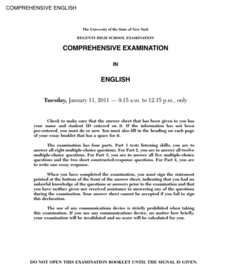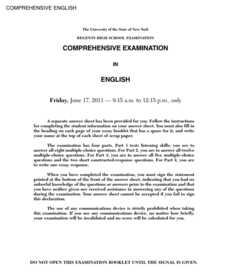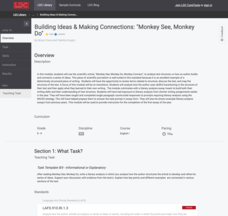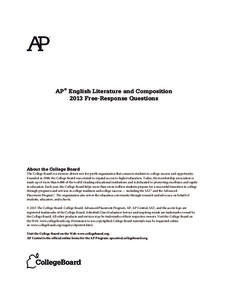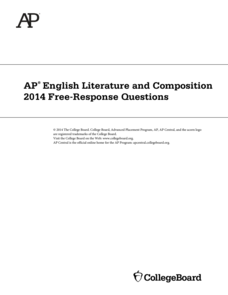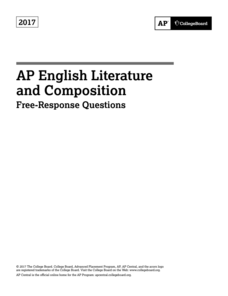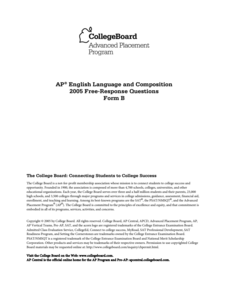New York State Education Department
English Language Arts Examination: June 2014
Should companies track consumers' shopping preferences without their permission? Using the resource, scholars write source-based argumentative essays to answer the question. They also answer reading comprehension questions based on an...
New York State Education Department
Comprehensive English Examination: January 2011
Scholars read an excerpt from the short story "The Bonfire" by Kunikida Doppo as well as a nonfiction passage about handcycling. Next, they answer comprehension-based multiple-choice questions. Additionally, they respond to short-answer...
New York State Education Department
Comprehensive English Examination: June 2011
Get those pencils sharpened—it's time to see what the class knows! Using the resource, scholars complete a four-part English examination. They read passages and respond to multiple-choice comprehension questions. They also complete two...
EngageNY
Grade 10 ELA Module 3: Unit 3, Lesson 10
Can budding writers accept constructive criticism? Learners work with their peers to gain feedback about their argumentative essay drafts. Peers give one another constructive criticism to revise their work better. Using a Peer Review...
EngageNY
Grade 10 ELA Module 3: Unit 3, Lesson 11
It's time to show what you know. Scholars finalize their argumentative essays by making last-minute revisions to conventions, tone, and formal style. Learners review the checklist to ensure they have met all the task requirements. They...
EngageNY
Grade 10 ELA Module 3: Unit 3, Lesson 4
Always try to make an excellent first impression. As scholars begin to write their argumentative essays, they learn the importance of a good introduction. Writers also begin to add in-text citations to their papers. After reading a model...
EngageNY
Grade 10 ELA Module 3: Unit 3, Lesson 1
Human tissue for sale or rent? Scholars refer back to articles they read in the previous unit and make a claim as to whether they believe it's okay to sell human tissue. Learners talk with partners, complete an outline tool, and collect...
EngageNY
Grade 10 ELA Module 4, Unit 2, Lesson 22
The Witches, Lady Macbeth, or Macbeth himself: who is the culprit? Using the resource, pupils craft multi-paragraph essays to present arguments about which character is responsible for the tragedy in Shakespeare's Macbeth. Additionally,...
EngageNY
Grade 10 ELA Module 4, Unit 2, Lesson 21
Which character bears responsibility for the tragedy in Shakespeare's Macbeth? Scholars participate in a gallery walk and complete a Quick Write to support their claims about which character is to blame.
EngageNY
Grade 10 ELA Module 3: Unit 2, Lesson 13
Is that your final answer? As part of the last lesson plan, scholars finalize their research portfolios. They review all of their claim tools and gain the perspective of others as they discuss their work with a group. To finish, they...
Literacy Design Collaborative
Building Ideas and Making Connections: "Monkey See, Monkey Do"
Reading a scientific article about cross-species synchronization may sound like a yawner. But "Monkey See, Monkey Do" is a fascinating tale that just happens to be about yawning, within and across species. After a close reading, class...
US National Archives
Eastern Europe 1939-45 — Ukraine
Was Joseph Stalin desperate or exaggerating the USSR's need for assistance on the Eastern Front in 1942? History students examine two differing opinions on Stalin's position and the reality of the Eastern Front just three years before...
The New York Times
Where to Draw the Line: Balancing Government Surveillance with the Fourth Amendment
The question of how to balance Fourth Amendment Rights with national security concerns becomes critical in an age of planned terrorist attacks, election interference, and fake news. Get young social scientists involved in the debate with...
College Board
2012 AP® English Literature and Composition Free-Response Questions
Does the world shape a person's character? Scholars choose a novel or play, take a close look, and write essays about how surroundings affect a character. Writers also analyze literary elements in an excerpt from a novel and poetic...
College Board
2013 AP® English Literature and Composition Free-Response Questions
Is there a moment that changed your life? Readers analyze novels and plays to discover the moments in which characters change from children to men. Writers also create essays to analyze literary devices used in The Rainbow and figurative...
College Board
2014 AP® English Literature and Composition Free-Response Questions
How much would you give up for others? The last prompt in 2014 AP® English Literature and Composition Free-Response Questions asks scholars to write essays about a character in a piece of work that has sacrificed and what the sacrifice...
College Board
2015 AP® English Literature and Composition Free-Response Questions
It is a cruel world. Scholars create essays about a piece of work that describes what cruelty reveals about a character. A prompt from the 2015 AP® English Literature and Composition Free-Response Questions also contains two other essay...
College Board
2016 AP® English Literature and Composition Free-Response Questions
Have you ever met a wolf in disguise? The last essay question in the 2016 AP® English Literature and Composition Free-Response exam asks writers to think of deceitful characters and create essays describing why they carried out...
College Board
2017 AP® English Literature and Composition Free-Response Questions
Music brings back a memory. One prompt from the 2017 AP® English Literature and Composition Free-Response Questions asks scholars to read a poem and write essays analyzing the relationship between music and the author's memories. Two...
College Board
2018 AP® English Literature and Composition Free-Response Questions
Can a gift be a burden? Scholars take a close look and write essays about characters that have gifts that can also be a disadvantage. Two other essays include discussion of how Nathaniel Hawthorne and Oliver Senior use literary...
College Board
2002 AP® English Language and Composition Free-Response Questions Form B
"Don't go forth today." Why would Caesar's wife not persuade him to stay home? Scholars read an excerpt from the play Julius Caesar and write essays on why Caesar listened to Decius rather than his wife. Pupils then write two more essays...
College Board
2003 AP® English Language and Composition Free-Response Questions Form B
You took the words right out of my mouth! One question in 2003 AP® English Language and Composition Free-Response Questions Form B allows scholars to develop opinions on pupils receiving zeros for plagiarism. Other essays analyze ideas...
College Board
2004 AP® English Language and Composition Free-Response Questions Form B
Are there unspoken rules everyone should follow? Questions from the 2004 AP® English Language and Composition Form B ask scholars to give opinions on how unspoken rules help people belong in society. Pupils also analyze a writer's...
College Board
2005 AP® English Language and Composition Free-Response Questions Form B
Communication is the key. Prompts from the 2005 AP® English Language and Composition Free-Response Questions Form B allows scholars two opportunities to analyze the use of communication to express thoughts. First, pupils look at...



